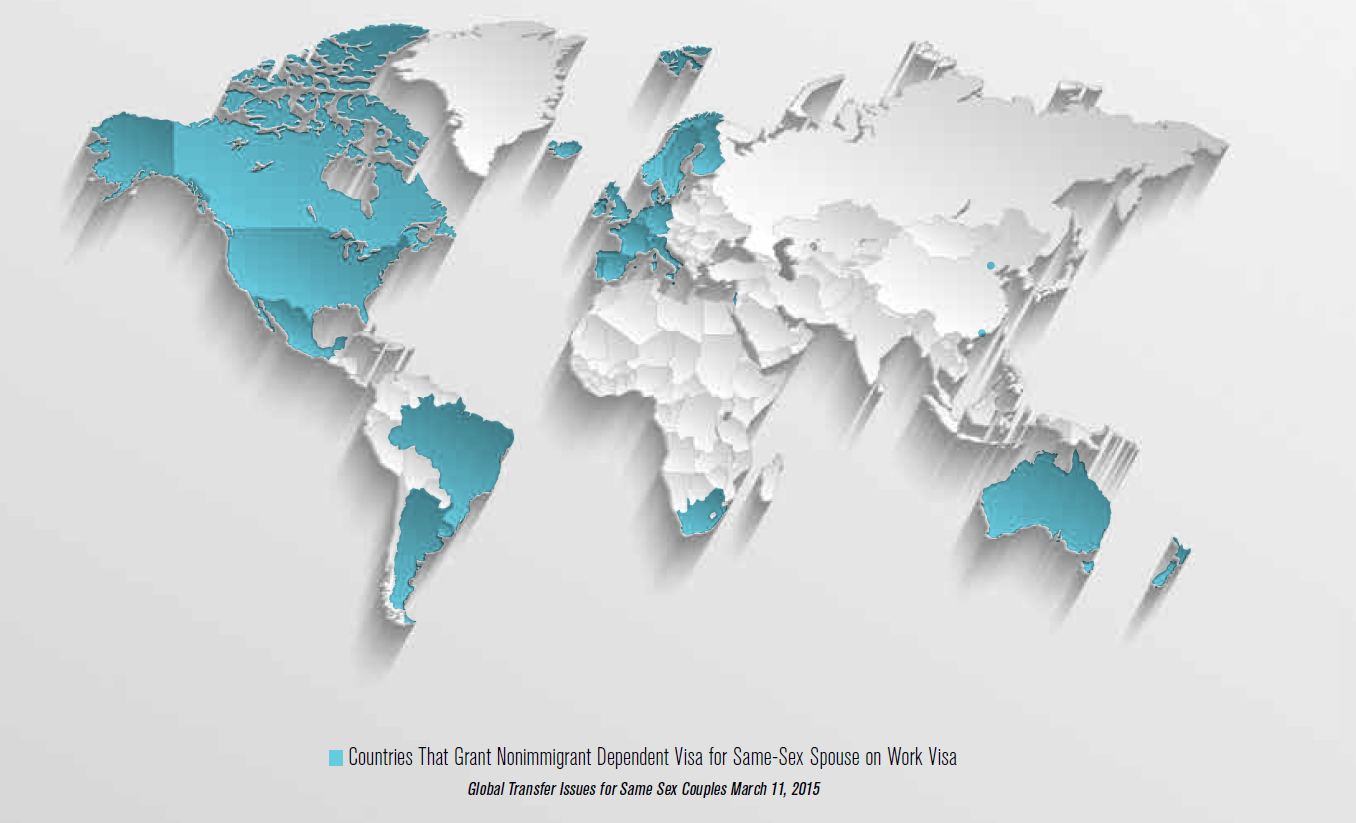
CHEAT SHEET
- Foreign immigration law considerations. Whether an expat employee qualifies for a work visa depends on the type of job, the qualifications of the employee, the salary offered and other similar factors.
- Visa considerations. From an immigration visa standpoint, a country may recognize a same-sex marriage, but not grant a dependent visa to the same-sex spouse.
- US federal law. Title VII of the Civil Rights Act does not prohibit discrimination based on sexual orientation.
- Guidance from the Equal Employment Opportunity Commission (EEOC). All employees who work in the United States or its territories for covered employers are protected by EEO laws, unless the employer is not a US employer.
You are in-house counsel for a multinational company. It is 10 pm on a Wednesday and you receive a message from John Scott, a top talent in your company and in his international rotation, who was recently posted to Malaysia to set up a satellite office. John is gay. He tells you that the company has determined that John is needed in Malaysia for an extended period of time. He is worried about how Malaysian law will impact his husband’s ability to join him for his posting, and other issues related to him being gay in a country that does not recognize the rights of people who are LGBTQ (an acronym for lesbian, gay, bisexual, transgender, and queer or questioning). You inform John that you are not aware of his husband’s visa status but will look into the matter first thing in the morning.
When you get into the office, you set up a call with John’s manager. She informs you that HR has told her that there is an issue with John’s husband’s visa because Malaysian authorities do not recognize John’s marriage. In fact, she says, John and his husband’s relationship itself is illegal in Malaysia. You quickly realize that John’s experience as an expat is going to be very different due to his sexual orientation.
John’s manager tells you that she knew John’s sexual orientation could be an issue in Malaysia, but she felt that he was the best person to run the new satellite office. She did not discuss the logistics of living in Malaysia as an LGBTQ employee because she feared it could be regarded as discriminatory. Thus, no one has discussed with John the harsh realities of relocating to a country that does not recognize his marriage and criminalizes his lifestyle.
You call your immigration attorney and explain the situation. She informs you that John’s husband may be able to obtain a dependent visa if he gets an amenable policy person in the Malaysian immigration office. Malaysian law does not recognize same-sex marriage and she tells you that same-sex relationships are illegal in that country. You immediately message John to update him and he says he really wished someone from the company discussed all of this with him before he was assigned to Malaysia.
Why didn’t John’s company discuss with John the potential difficulties of accepting a project in a country that does not recognize, and in fact could prosecute, people who are LGBTQ? What could John’s company have done differently? If an employee is denied a transfer or placement to a position in a foreign country based on how that employee or his/her spouse might be treated in the foreign country, does the denial equate to discrimination based upon gender, marital status or sexual orientation?
Foreign immigration law considerations
Effective management of international work assignments requires careful planning and attention to both United States’ and the host country’s laws. Human resources disciplines involving benefits, compensation, taxation, insurance, labor relations and immigration laws must all be considered. How the transfer will affect family and pets (which, surprisingly, can become a major factor) also must be considered. There is often so much to consider that little thought may be given to the other country’s culture and how an LGBTQ individual or family will be treated once the transfer is completed.
Focusing strictly on the immigration issue, long-term expat assignments involve obtaining permission to work for the employer in the host country. Each host country has its own unique set of immigration laws, and whether an expat employee qualifies for a work visa depends on the type of job, the qualifications of the employee, the salary offered and other similar factors. In a typical expat situation, if the principal qualifies for a work visa, the dependent visa generally will follow. This is not true in same-sex marriage or civil union cases.
Laws affecting LGBTQ people vary greatly by country. Some countries allow or recognize same-sex marriage while many others do not, or worse. Some countries recognize civil unions between same-sex partners. From an immigration visa standpoint, a country may recognize a same-sex marriage, but not grant a dependent visa to the same-sex spouse. Other countries prohibit same-sex sexual activity or identity, with criminal punishment ranging from jail time to the death penalty.
Immigration attorneys are usually advised about expat transfers near the end of the process — after the negotiations have been completed and the offer has been extended and accepted. In the case of an LGBTQ employee, it is crucial to bring the immigration lawyer into the fold at the beginning.
US federal and state law
US federal discrimination law (Title VII of the Civil Rights Act) does not prohibit discrimination based on sexual orientation. However, some local or state laws currently prohibit discrimination based on sexual orientation. Under those laws, companies are prohibited from using sexual orientation as a basis for adverse employment decisions.
Furthermore, federal discrimination law (Title VII) prohibits discrimination based upon gender. Gender discrimination may factor in the situation described above because the Equal Employment Opportunity Commission (EEOC) and some courts have found lesbian, gay, and bisexual individuals who allege sex-stereotyping have a sex discrimination claim under Title VII. According to these decisions, the sex-stereotyping argument exists when an employee’s appearance or demeanor fails to comport with a company’s preferred feminine or masculine stereotype. Any adverse action taken is based on stereotyping and not job performance or qualifications. Adding to the complexity is whether the transfer denial or employment violates Title VII’s prohibition against adverse employment actions due to marital status. Another question is whether adverse action due to marital status may violate Title VII if used to deny or limit employment opportunities to an LGBTQ individual.
Do equal employment opportunity laws like Title VII and similar state and local laws apply in situations involving multinational employers? May a US employer sending employees oversees lawfully ask questions about marital status or express concern about potential dangers to a gay employee or applicant seeking a position in an intolerant country? If a company denies an employee transfer or employment opportunity in a foreign country based on potential discrimination in the foreign country, is the US employer at risk for violating these laws?
Currently, guidance from the EEOC on employee rights under federal EEO laws when working for multinational employers include the following rules:
- All employees who work in the United States or its territories for covered employers are protected by EEO laws, unless the employer is not a US employer and is subject to a treaty or other binding international agreement that permits the company to prefer its own nationals for certain positions.
- Individuals who are not US citizens are not protected by EEO laws when employed outside of the United States or its territories.
- US citizens employed outside the United States by a US employer or a foreign company controlled by a US employer are protected by EEO laws.
- US employers are not required to comply with an EEO law requirement if adherence to the requirement would violate the law of a country where the workplace is located. The “foreign laws” exception is, however, narrowly construed and requires the employer to prove compliance with the US law will inevitably violate the foreign law.
While these rules provide some guidance, they leave unanswered the question of whether an employer can refuse to send an LGBTQ employee into an employment situation oversees where the employer knows the employee could face severe discrimination or abuse because of sexual orientation but it is not illegal for a LGBTQ individual to live or work in that country. Under those circumstances, does an employer violate EEO laws if it raises concern to the employee or refuses to send the employee due to safety concerns? If the employer does not raise the issue and sends an employee to a country that disfavors or bans homosexuality and the employee and/or a same-sex spouse suffers harm, can the employer be held liable under negligence tort claim theory? Can the employer be held liable for harm if it raises concern and shares the possible risk and the employee chooses to go anyway?
Because the current rules do not address such situations, US employers should take steps to inform all applicants and employees of any potentially difficult employment issues facing them in foreign jurisdictions. Providing information to all candidates in a neutral manner will help avoid discrimination claims where a particular employee is the only one told. Once informed, employees can decide if they want to proceed with the position. Employers should consult the foreign country’s US embassy to determine whether EEO or other employment laws exist in the country and apply to the current situation. Outside of taking these steps, an employer must abide by US discrimination law for US citizens working in other countries within the rules set forth above.
As businesses continue to expand their global footprint, being aware of and actively working through unique and challenging issues facing LGBTQ expats are becoming increasingly important. Understanding that expat transfers involve immigration, benefits, employment law, and business considerations will help build the team needed to effectuate the best global transfer result.
| Country | Nonimmigrant Dependent Visa for Same Sex Spouse on Work Visa | Nonimmigrant Visa for Same Sex Partner or Civil Union Partner | Same Sex Marriage Performed in Country | Is LGBTQ Sexual Activity a Crime/Illegal? |
|---|---|---|---|---|
| Algeria | Unlikely | Unlikely | NO | Prohibited by Articles 333 (up to 3 years in prison for any public acts involving homosexual acts) and 338 (up to 2 years in prison if guilty of homosexual acts) of the Algerian Penal Code. |
| Argentina | YES | NO | YES | NO |
| Australia | YES | YES | NO — civil partnerships may be recognized after 2 years. Legislation being considered. | NO |
| Bahrain | Unknown | Unknown | NO | Homosexuality between adults (above 21) is legal. |
| Belgium | YES | YES | YES | NO |
| Brazil | YES | YES | YES in some counties | NO |
| Cambodia | NO | NO | NO | NO |
| Canada | YES | YES (co-habitation for one year) | YES | NO |
| Chile | Perhaps | Perhaps | NO — but legislation is pending | NO |
| China | NO — except Beijing | NO — except Beijing | NO | NO |
| Colombia | Perhaps | Perhaps | Registered Partnership Only | NO |
| Denmark | YES | YES | YES | NO |
| Egypt | Unknown | Unknown | NO | Egypt does not have an express ban on same sex relationships. However, homosexuality is prohibited through different laws. See Law 10/1961 (to combat prostitution); Penal Code art. 98w (contempt for religion); Penal Code art. 278 (shameless public acts) |
| Finland | YES | YES | YES | NO |
| France | YES | YES | YES | NO |
| Germany | YES | YES | NO — but registered partnerships allowed | NO |
| Ghana | NO | NO | NO | YES |
| Hong Kong | YES | YES | NO | NO |
| Iceland | YES | YES | YES | NO |
| India | NO | NO | NO | YES |
| Iran | NO | NO | NO | Homosexuality is prohibited and homosexuals could be executed. However, the government encourages individuals to undergo the extremely popular sex reassignment surgery. |
| Iraq | NO | NO | NO | Article 3 of the Iraqi Personal Status law defines marriage as a union between a man and a woman, and for the purpose of procreation. New laws are silent about homosexual relationships, but society does not accept homosexuals. |
| Ireland | YES | Only if relationship is for a particular length of time | Unknown | NO |
| Israel | YES | YES | NO | NO |
| Italy | YES (if EU resident) | NO - under consideration | NO - under consideration | NO |
| Japan | Possible but low probability | Possible but low probability | NO | NO |
| Jordan | Unknown | Unknown | NO | Although non-commercial homosexual conduct between consenting adults (above 16) is legal, same-sex marriages, or civil unions, are not legally recognized in Jordan. |
| Korea, North | NO | NO | NO | Unknown |
| Korea, South | NO | NO | NO | NO |
| Kuwait | Unknown | Unknown | NO | Homosexuals are prosecuted pursuant to different laws. See, e.g., Article 193, Penal Code, Law No. 16 of June 2, 1960, as amended in 1976 (Punishing debauchery with up to 6 years of imprisonment); Article 198 (prohibiting the imitation of appearance of a member of the opposite sex.). |
| Laos | NO | NO | NO | NO |
| Lebanon | Unknown | Unknown | NO | Article 534 of the Lebanese Penal Code prohibits having sexual relations that are "contradicting the laws of nature," which is punishable by up to a year in prison. (One court has invalidated) |
| Luxemburg | YES | YES (Must be Declared Partnership) | YES — soon | NO |
| Malta | YES – if greater than or equal to 2 year relationship | YES for EU citizens | Civil Unions allowed | NO |
| Malaysia | Possible — not guaranteed | Unclear | NO | YES |
| Mexico | YES | Possible — more stringent requirements | Regional authority only | NO |
| Morocco | Unknown | Unknown | NO | “Lewd or unnatural acts with an individual of the same sex” are punishable by imprisonment for up to 3 years pursuant to Article 489 of the Moroccan Penal Code. |
| Netherlands | YES | YES | YES | NO |
| New Zealand | YES | YES | YES | NO |
| Nigeria | NO | NO (Imprisonment) | NO | YES |
| Norway | YES | YES | YES | NO |
| Oman | Unknown | Unknown | NO | Punishable by imprisonment of up to 3 years. See Arts. 33 and 223 of the Omani Penal Code of 1974. |
| Peru | NO | NO | Civil Union legislation proposed/pending | NO |
| Philippines | NO | NO | NO | NO |
| Poland | NO (But may be issued for EU citizens and discretionary for any US citizens) | NO (But may be issued for EU citizens and discretionary for any US citizens) | NO | NO |
| Puerto Rico | Unclear-should follow US law | Unclear | NO | NO |
| Portugal | YES | Perhaps | YES | NO |
| Qatar | Unknown | Unknown | NO | Qatar does not recognize same-sex marriages. Article 296 of the Penal Code punishes sexual relationships between men with up to three years in prison. Sexual relationship between women is not addressed, but they could be sentenced under public indecency or anti-fornication laws. |
| Russia | NO | NO | NO | NO but laws exist criminalizing LGBTQ propoganda |
| Singapore | NO | NO | NO | NO |
| Saudi Arabia | Unknown | Unknown | NO | Homosexuality is prohibited and punishable with the death penalty in certain cases. |
| Somalia | Unknown | Unknown | NO | Homosexuality is illegal and the law prescribes up to three years in prison. See Articles 409–410, Penal Code, Legislative Decree No. 5/1962. |
| South Africa | YES | YES | YES | NO |
| Spain | YES | Unknown | YES — if it is Spanish citizen or resident | NO |
| Sweden | YES (EU Nationals) | YES | YES — registered partnerships | NO |
| Switzerland | YES | YES | YES | NO |
| Syria | Unknown | Unknown | NO | Such relationships are illegal. They are, in fact, prohibited pursuant to Article 520 of the Syrian Penal Code, which provides that relationships against the order of nature are sentenced for up to 3 years in prison. |
| Thailand | NO | NO | NO | NO |
| Tunisia | Unknown | Unknown | NO | Article 230 of the Penal Code prohibits private acts of “sodomy” between consenting adults with up to 3 years of prison time. |
| Turkey | NO | NO | NO | NO |
| UAE | Unknown | Unknown | NO | Sexual relations outside of a traditional, heterosexual marriage are a crime. Foreigners are generally deported after serving their prison sentence. |
| UK | YES | YES – more stringent requirements | YES | NO |
| United States | YES | YES | YES – regional | NO |
| Uruguay | YES | YES | YES | NO |
| Yemen | NO | NO | NO | Same-sex relationships are prohibited in Yemen and the death penalty is generally imposed on adults convicted of having a consensual relationship with another adult from the same sex. |
| Vietnam | NO | NO | YES but no legal protection | NO |





